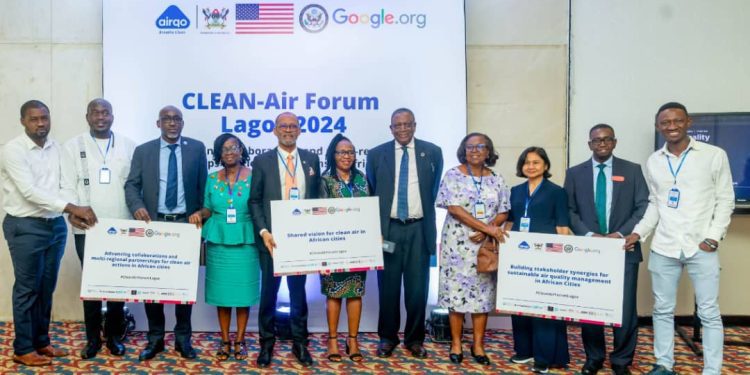By Nnaji Charles
The Clean Air Forum 2024 brought together a diverse group of stakeholders to address the growing concern of air pollution in African cities. It was organized by AirQo, Makerere University; Air Quality Monitoring Research Group (AMRG), University of Lagos; and Lagos State Environmental Protection Agency (LASEPA).
The forum, held at Radisson Blu Hotel, Ikeja, Sheraton Lagos Hotel, Ikeja, and Lagos Continental Hotel, Victoria Island, Lagos, saw attendance from media representatives, academics, policymakers, and environmental experts from across Africa. Presentations and discussions focused on innovative solutions to air pollution, including the use of technology in monitoring air quality, environmental sustainability practices, and the transition to clean energy for cooking and transportation.
The event culminated in a dinner on Thursday, July 11, at Lagos Continental Hotel where the Executive Governor of Lagos State was represented by Mr. Tokunbo Philip Wahab, the Honourable Commissioner for the Environment and Water Resources. Other notable attendees included Professor Folasade Tolulope Ogunsola, the first female Vice Chancellor of the University of Lagos, and U.S. Consul General Will Stevens, along with several other foreign dignitaries.
Dr. Bolajoko Malomo, a keynote speaker, emphasized the critical role of public and community engagement in addressing air pollution. “Air is a shared resource. We can’t stay here without air. So whether air is polluted or not, we breathe in air. Something has to be done,” Dr. Malomo stated. She highlighted alarming statistics, noting that PM2.5 and PM10 levels in some Nigerian locations significantly exceed WHO guidelines.
Dr. Malomo stressed the importance of effective communication strategies, including the use of local languages and consistent messaging. “We need to communicate in our local languages. Don’t restrict it only to the English language,” she advised, emphasizing the need to reach all segments of society, including those who may not understand English.
Dr. Victor Nthusi provided insights into the sources and health impacts of air pollution. He presented historical data showing air pollution’s rise as a major cause of death in Africa, now ranking second only to malnutrition. Dr. Nthusi advocated for stricter regulations and balanced storytelling to drive action. “Sometimes you have to measure all these things and reach some kind of balance as you do your stories,” he noted, highlighting the complex interplay between environmental concerns and economic realities.
Matthew Bbaale of AirQo discussed the crucial role of data and digital tools in improving air quality. He emphasized the importance of accessible, comprehensive data for decision-making and public awareness. “To have an impactful way of communicating the effects of air quality data, you might need to compare it to other types of data,” Bbaale explained, while also acknowledging the challenges in accessing sensitive information like health statistics.
The forum underscored the need for a multi-stakeholder approach to tackle air pollution effectively. Participants highlighted successful collaborations and partnerships, emphasizing the importance of regional networks and sustained interventions for long-term impact.
Media representatives at the forum were called upon to play a crucial role in driving public engagement and holding policymakers accountable. “The media plays a pivotal role in this endeavor. The ability to tell compelling stories, uncover truths, and hold those in power accountable is crucial in driving public engagement,” Dr. Malom stated.
The message was clear: achieving clean air for all Africans requires consistent effort, education, community involvement, and effective communication. As Dr. Malomo concluded, “By engaging the public and our communities, we can build an Africa where clean air is a reality for all. Let us leverage the power of education, community involvement, and effective communication to make this vision a reality.”
As delegates departed, the buzz of conversation and exchange of contact information signaled that the connections made and ideas shared at the Clean Air Forum 2024 would continue to drive action long after the event’s conclusion. The challenge of air pollution in Africa remains daunting, but the forum has kindled a spark of hope and determination among those at the forefront of this crucial battle for public health and the environment.

